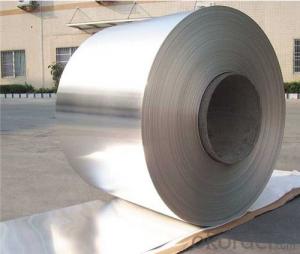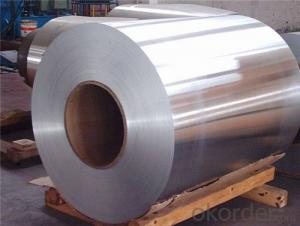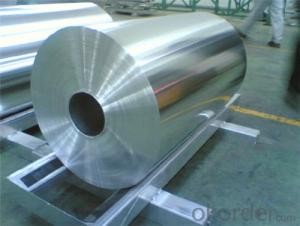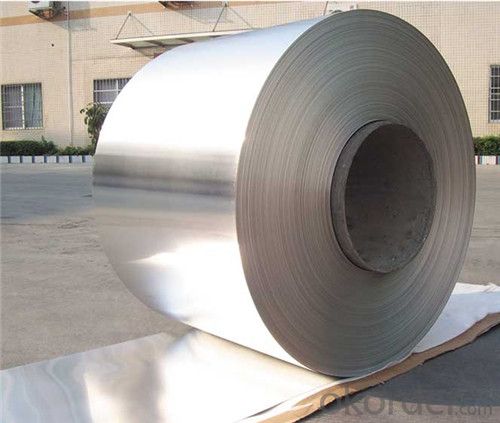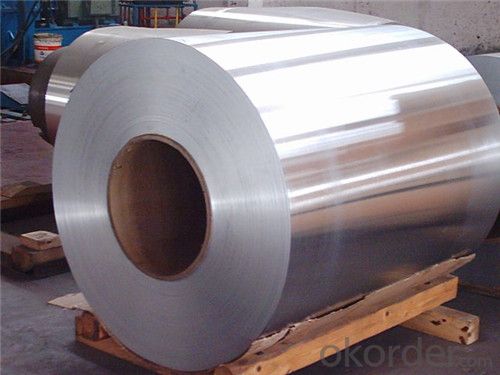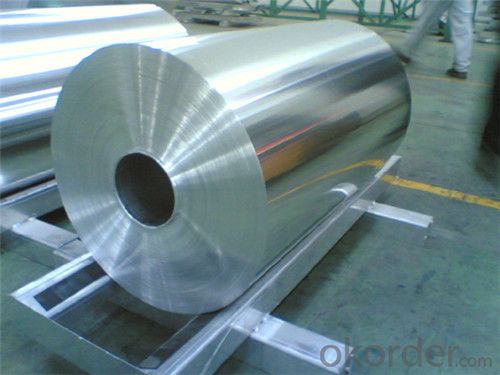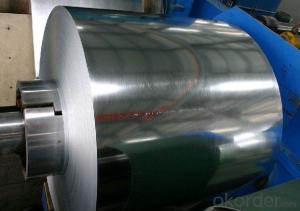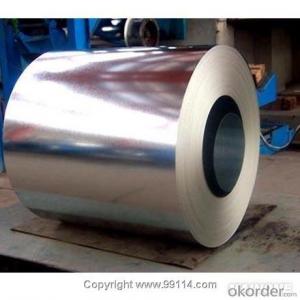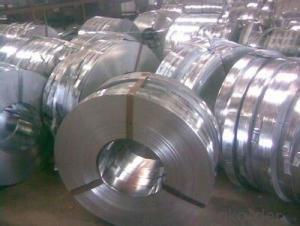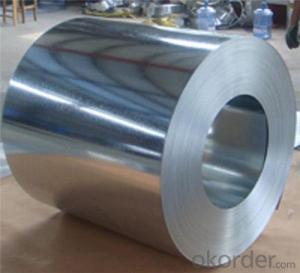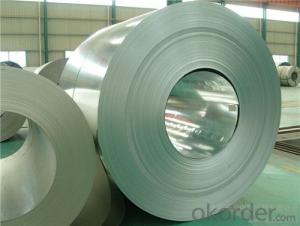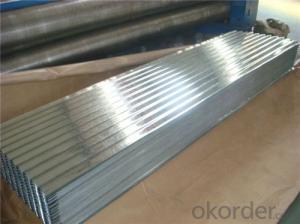Al-Zinc Coated steel coil for construction roof
- Loading Port:
- Shanghai
- Payment Terms:
- TT OR LC
- Min Order Qty:
- 25 m.t.
- Supply Capability:
- 30000 m.t./month
OKorder Service Pledge
OKorder Financial Service
You Might Also Like
Structure of Al-Zinc coated steel coil
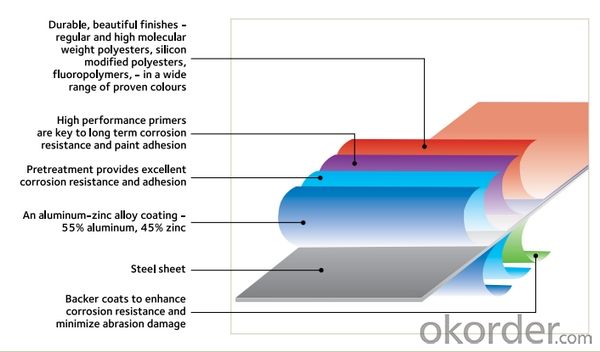
Description of Aluminum Zinc Rolled Coil
The detailed information for the Al-Zinc coated steel coil is as following and it is mainly using for roofing producing, making ceiling grid and all kinds of roll forming structure.
Thickness: 0.20mm to 1.20mm
Width: 914mm, 1000mm, 1200mm, 1219mm and 1250mm, or slit narrow strip according to customer request, can be slit from 20mm to 610mm.
Coil ID: 508mm
Coil weight: 3 tons to 6 tons
Thickness tolerance: +/- 0.02mm or according to customer request.
Main Feature of Al-Zinc coated steel coil
1.Corrosion resistance: It mainly depends on the aluminum protection. When the zinc being worn, the aluminum will form a dense layer of aluminum oxide, resist corrosion material to prevent further corrosion inside.
2. Heat resistance: Aluminum zinc alloy steel sheet has excellent heat resistance, can withstand high temperatures over 300 centigrade, and is similar with aluminized steel high temperature oxidation resistance. It often used in chimney pipes, ovens, fluorescent lighting device and the device cover.
3. Heat reflective: Galvanized steel plate heat-reflective high rate is twice as galvanized steel, often used to make insulation materials.
4. Economy: Because density of 55% AL-Zn is smaller than the density of Zn, so in the same weight and thickness of Galvanized zinc layer, aluminum-zinc steel plate is larger area more than 3% of galvanized steel sheet.
Applications of Al-Zinc coated steel coil
1. Construction and building: roofing; ventilating duct; handrail; partition panel;etc.
2. Electric appliance: refrigerator; washing machine; refrigerator; DVD;etc.
3.Transportation: oil tank; road sign; etc.
4.Agriculture:barn; etc.
5.Others:vending machine; game machine; etc.
Specifications of Al-Zinc coated steel coil
Prepainted galvanized steel coil ( PPGI ) | Prepainted galvalume steel coil ( PPGL ) | |
Standard | JIS G3312 CGCC | J IS G3322 CGLCC |
Valid thickness | 0. 16 ~1. 2 0mm | 0. 16 ~1. 2 0mm |
Coil width | 600~1250mm | 600~1250mm |
Coil ID | 508mm & 610mm | 508mm & 610mm |
Coil weight | 3~5 tons | 3~5 tons |
Coating | 4 0~275 g/m2 | AZ30 to AZ150 |
Paint t hickness , top side | 15~25 microns | 15~25 microns |
P aint t hickness , reverse | 5~7 microns or 15~25 microns | 5~7 microns or 15~25 microns |
Color | any RAL code | any RAL code |
Package | vertical, eye to sky & horizontal | vertical, eye to sky & horizontal |
MOQ | 25 tons | 25 tons |
FAQ of Al-Zinc coated steel coil
We have organized several common questions for our clients,may help you sincerely:
1. What is the minimum order quantity ?
Our MOQ is 50mt for each size. And we will consider to give more discount if you make big order like 1000 tons and more. Further more, the more appropriate payment term your offer the better price we can provide.
2. How long can we receive the product after purchase?
Usually within thirty working days after receiving buyer’s advance payment or LC. We will arrange the factory manufacturing as soon as possible. The cargo readiness usually takes 15-25 days, but the shipment will depend on the vessel situation.
3. How to guarantee the quality of the products?
We have established the international advanced quality management system,every link from raw material to final product we have strict quality test;We resolutely put an end to unqualified products flowing into the market. At the same time, we will provide necessary follow-up service assurance.
- Q: I need to identify a metal. It is rusty so I suspect it is either iron or steel. Since they both have similar densities and are magnetic, how do I tell the difference betweeen steel and iron?
- Steel is a refined, alloyed metal that is mostly iron. Iron, in a chemistry sense os simply Fe. In an industrial sense iron is pig iron commonly saturated with carbon, up to 4.5% and has other impurities like sulfur. Pig iron is brittle and should break rather easily, and bend very little. After a piece is broken look at the crystal structure, you should see rather small crystals. Most steel made for car body's, washing machines, file cabinets, low grade bolts and nuts etc. should flex and bend before breaking. Most steel made for things like cutting tools, axles, etc, is hardened and will chip and break rather than bend. Also you can try to heat the piece to a glowing orange temperature. It must be very hot. Cool it. If there is a lot of white flake scale on the piece it is impure and probably iron of some sort. In the end the only way exactly tell is have an analysis done and look at the chemistry.
- Q: I asked a question last week about stainless steel and got some great answers. I combed all over the internet to try to figure this one out but could not find anything. What resists bending better: chrome vanadium steel (i.e. a steel commonly used to make tools) or stainless steel 304. My guess would be the chrome vanadium alloy but thats just a guess. Which on resist's bending better and by how much (#'s please :-)). Also, if anyone knows if chrome vanadium steel is cheaper than stainless steel 304 that would be awesome? I can't find a price per pound on chrome vanadium steel anywhere! Please help. Thanks in advance-Josh
- All okorder /... it can only be hardened somewhat by cold working. Bending stiffness is not proportional to tensile strength.
- Q: I'm building a single-speed commuter bike and I was wondering what the advantages and disadvantages of steel and alloy wheels are. Any experts out there who can give me specifics for each kind?
- Alloy wheels are definitely the standard on most bikes nowadays, ive always bought rims from mavic and they have always taken a battering. In fact the last two bikes i owned both cracked while the wheels were almost perfect! Different types of rims can be bought depending on how you ride and of course the more you pay generally the better the rims. Also alloy wheels will be a lot lighter and corrosion resistant . Hope this helps
- Q: How are steel coils used in the manufacturing of body reinforcements?
- Steel coils are used in the manufacturing of body reinforcements by being processed and shaped into various structural components, such as beams and frames, which provide strength and support to the body of a vehicle. These reinforcements help enhance the vehicle's structural integrity, ensuring safety and protection for the occupants in the event of a collision or impact.
- Q: I'm getting microdermals, from a very experienced piercer, but they don't have titanium and I know titanium is the best for this, but is Grade A Srugical Steel okay too?(P.S. also instead of getting flat heads, of the microdermals, I'm getting flat crystal like ones, are those okay? I know to be careful, I am veryyyy careful with my body, so much that I'm worried I'm going to overly do it when I get them and dry out the skin or something hahaa xp)THANK YOU ALL IN ADVANCE FOR THE HELP
- Perfect! 3
- Q: What website can I use to find a good picture that shows the atomic structure of a carbon steel?
- Carbon steel is a polycrystalline substance containing several compounds. Most of it is iron, but there are crystals of austenite and martensite present, plus other iron carbides. Each of these has a different atomic structure. The properties of the steel depend not so much on the atomic structures of the compounds, but more on the size and abundance of the crystals. The function of these crystals is to impede the movements of dislocations through the iron.
- Q: How are steel coils processed for galvanizing or coating?
- Steel coils are processed for galvanizing or coating through a series of steps. First, the coils are cleaned to remove any dirt or oil. Then, they go through a chemical treatment to prepare the surface for coating. After that, the coils are coated with a layer of zinc or another protective material. Finally, the coated coils are cured or heated to ensure proper bonding and adhesion of the coating.
- Q: How are steel coils used in the production of agricultural fencing?
- Steel coils are used in the production of agricultural fencing as they are transformed into wires that are woven, welded, or twisted to create durable and sturdy fences. These steel coils are typically made from high-quality steel, which ensures strength and longevity, making them ideal for withstanding the demands of agricultural environments.
- Q: How are steel coils tested for dimensional accuracy?
- Steel coils are typically tested for dimensional accuracy using various methods such as measuring the width, thickness, and diameter of the coil. This can be done using specialized instruments like calipers, micrometers, and laser scanners to ensure the coil's dimensions meet the required specifications.
- Q: I have taylormade burner steel irons and I was wondering what would the flex of steel be if you were to compare it to graphite shafts, like regular, stiff, super stiff, etc...THANKS!!!!!!!!!!!!!!!!!!!!!!!!!!!!!!!!!!!!!!
- If i understand you correctly, i think you misunderstand shafts. Steel shafts vs. graphite shafts these days is more of a competition of weights, not flexibility. Both steel and Graphite have different flex profiles available from Ladies (L) to super stiff (X). Graphite may feel a little more whippy than steel because of the lighter weight. Shafts will vary by company as well. Stiff from True temper may not be as stiff as one from Aldila, or vice verse. You can also make a shaft play stiffer or more flexible by where you cut the length. This is called tipping. Take more from the bottom and it will be stiffer, more from the grip end and it will play more flexible.
Send your message to us
Al-Zinc Coated steel coil for construction roof
- Loading Port:
- Shanghai
- Payment Terms:
- TT OR LC
- Min Order Qty:
- 25 m.t.
- Supply Capability:
- 30000 m.t./month
OKorder Service Pledge
OKorder Financial Service
Similar products
Hot products
Hot Searches
Related keywords
